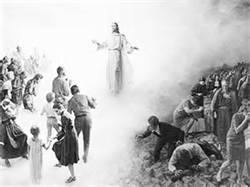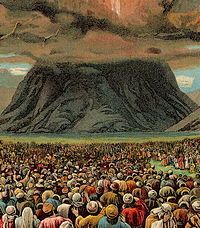Bible: What Does Romans 2 Teach Us About God's Judgment?
The Apostle Paul

Romans 2: God's Condemnation Upon the Unrighteous Jew
Romans 2
Do Not Have a Spirit of Judgment
Paul pronounces as without excuse before God the person (“O man”) who condemns reprobates (“whoever you are who judge”), because one who habitually condemns others commits the same kinds of offenses (v. 1).
[How does this declaration square with Jesus’ statement: “Do not judge according to appearance, but judge with righteous judgment”? (John 7:24).
See also Matthew 7:1-5.]
The apostle (and all believers?) knows that God will punish all those who practice unrighteousness (v. 2).
[NASB’s interpretation that God’s judgment “rightly falls upon” sinners clarifies NKJV’s vague translation (“is according to truth”)].
Again directly addressing the “man,” Paul censures him with two rhetorical questions:
(1) Does he—the one who judges and commits the same kinds of sins as those who offend—think that God will not judge him? (v. 3); and
(2) Does he not ignorantly despise (think lightly, NASB) the goodness of God that the Lord employs to lead him to repentance? (v. 4)
[Is the unrighteous Jew the “man” whom the apostle addresses here?]

John MacArthur
Judgment of Unbelievers Is Based on Works
Outraged by the Jew’s misguided attitude about his own untoward behavior and spiritual ignorance, Paul informs him that his self-righteous perspective has so affected the core of his being that he cannot repent.
The apostle pictures the man’s obstinate spirit figuratively gathering God’s wrath toward himself as if the latter were a treasure of good deeds prepared for the time when God will reveal His righteousness in judgment (v. 5).
[One should construe this “day” of judgment as a final period during which God will both reward believers and punish unbelievers.
It cannot refer only to the time of the Great White Throne Judgment (see Rev. 20:11-15), for no believers will experience judgment there.
God consigns only the lost, both small and great, into the Lake of Fire after this event.
“This day” might point to two other eschatological judgments occurring at the end of the Great Tribulation —one for Gentiles and the other for Jews—that will determine their status during the Millennium (see Ezek. 20:33-38; Mt. 25:31-46)].
The individual’s deeds neither earn eternal life nor merit God’s indignation, but they manifest his or her heart’s spiritual standing before the Lord (v. 6).
Some Jews and Gentiles who possess a heavenly perspective (“seek glory, honor, immortality”) continue to do good works; these believers evidence a right relationship with God, and will enter into the fullness of eternal life (“glory, honor, peace”) [vv. 7, 10].
Conversely, other Jews and Gentiles who live only to acquire all that they can to expend in the present age and who show no predilection toward eternal truth will experience horrible anguish because of the wrath from God (vv. 8-9).
God will employ the same principles, no matter whether He judges Jews or Gentiles (v. 11).
The Giving of the Law

Never Heard the Gospel?
What will God do with people who have never heard the Gospel?
Failure to Follow the Commandments
Having expressed how the Jew ought to have lived, the apostle now asks a series of rhetorical questions that asserts the nation’s failure to practice the commandments their leaders taught.
Paul accuses them of stealing from others, of committing adultery, of participating in idolatry, and of dishonoring God through general law breaking (vv. 21-23).
He alludes to the OT thought that the Gentile world blasphemes God because of this Jewish hypocrisy (v. 24; cf. Is. 52:5).
Physical and Spiritual Circumcision
Paul argues that a Jew’s circumcision would benefit the latter only if he keeps the Law (v. 25).
[Is he implying that people can keep the Law and therefore profit from the ritual, or is he saying that it is impossible to keep the Law and therefore the ritual is useless?]
Gentiles who live righteous (that is, “spiritually circumcised”) lives will judge the privileged (spiritually uncircumcised) Jews who transgress the law (vv. 26-27).
The apostle stresses that true Jews have received a spiritual circumcision of their hearts, and that the physical ritual matters not at all (vv. 28-29).
The Work of the Law
view quiz statisticsFailure to Live Up to the Light You Have
Impenitent Gentiles who sin against the light/knowledge they have (but not against the Law) God will eternally separate from Himself, and unrepentant Jews who sin against the Mosaic Law, God will judge according to its dictates during the “day” of judgment (vv. 12, 16).
Paul’s parenthetical aside (vv. 13-15) first stresses that Jews who obey the Law, not just those who hear it, God declares righteous (v. 13).
[For God to declare one righteous, one would have to keep His commandments perfectly—an impossible feat for sin-cursed human beings.
Therefore, Paul must mean here that saved Jews can still manifest the righteousness they received through faith in Christ by obeying the Law, even though they may do so imperfectly.]
Furthermore, he states that some Gentiles, who do not have the Law as a guide to living, still manage to obey the moral code innate in all people.
As God’s image bearers, they listen to the dictates of their conscience (“the work of the law written in their hearts”), and oftentimes do righteously (vv. 14-15).
[Unregenerate people (who are, by nature, evil) can still perform “good” deeds, yet these deeds cannot earn them salvation from their sins.]
What the Jewish People Should Have Been
Now the apostle directly addresses the “Jew” (v. 17a): a representative of the people divinely privileged to represent God (vv. 17b- 20), yet guilty before Him and man alike because they failed to live up to the accompanying responsibilities (vv. 21-24).
Paul lists several of the traits that should have characterized this nation. They should have:
(1) Shown implicit trust in torah, relying upon its prescriptions;
(2) Exalted God over all else (v. 17b);
(3) Known what God expects from human beings (v. 18a);
(4) Understood Scripture well enough to help others “differentiate between highest matters and side issues” (v. 18b; cf. Phil. 1:10; see Ryrie, New Testament Study Bible, 352);
(5) Known spiritual truth, so that he could confidently teach and guide the spiritually blind, foolish, and ignorant (vv. 19-20).
© 2013 glynch1









